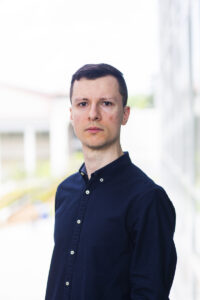This is the seventh and last post in a series of interviews conducted by the Woodruff Library with the 2021-2022 Woodruff Library and Emory Center for Digital Scholarship (ECDS) Fellows. Funded by the Laney Graduate School, the library and ECDS award fellowships to advanced graduate students expecting to complete their dissertations by the end of the fellowship period. Fellows are placed within the Woodruff Library and ECDS to work in an area related to their subject specialization or interest, culminating in a formal presentation in the spring.
Tell us a little bit about yourself. Where are you from?
I am from Belarus. I was born in a town called Kobryn, close to the border with both Poland and Ukraine, although I grew up in other places, mostly in Vierajcy. After graduating from a university in Belarus, I was working at a think tank for two years, then studied in a master program in Spain for two years, and then came to Atlanta.
What’s your favorite book?
To avoid mentioning well-known titles, let me choose “Новая зямля” (“The New Land”) by Jakub Kolas, first published in 1923. This semi-autobiographical poem describes the life of the Belarusian peasantry during the late 19th — early 20th after the abolition of serfdom in 1861 and the January Uprising of 1863–1864.
What’s your favorite thing about Emory/Atlanta?
I like the presence of the plethora of animals in the area who seem to coexist relatively peacefully.
What are you researching for your dissertation?
My dissertation is on the optimal design of government policies to avoid or ameliorate the effects of financial crises, such as banking or sovereign debt crises.
What interested you about the Woodruff Library Fellowship?
It was a rare opportunity for PhD candidates from STEM fields, and I could apply my five-semester experience in teaching statistical programming to Emory students. In the pre-pandemic time, I used to work in the library often and liked the environment.
What will you be working on this year for your Woodruff Library Fellowship?
I will be helping with consultations on data-related questions and with educational workshops.

